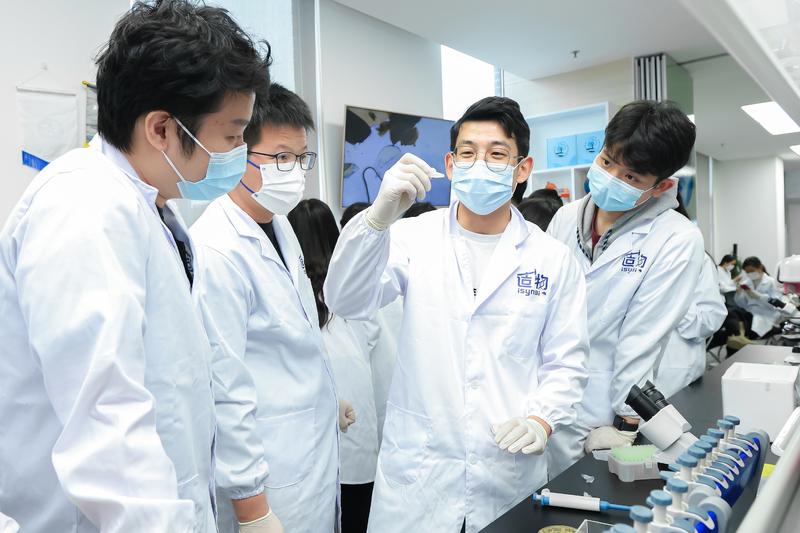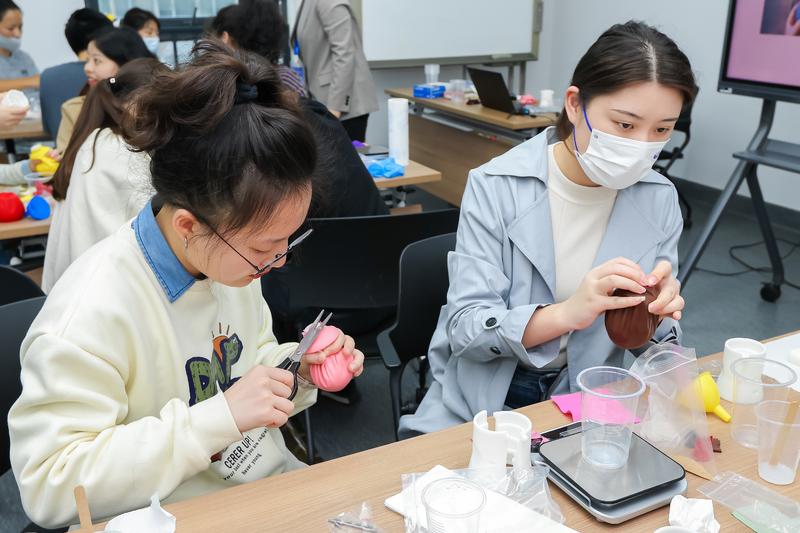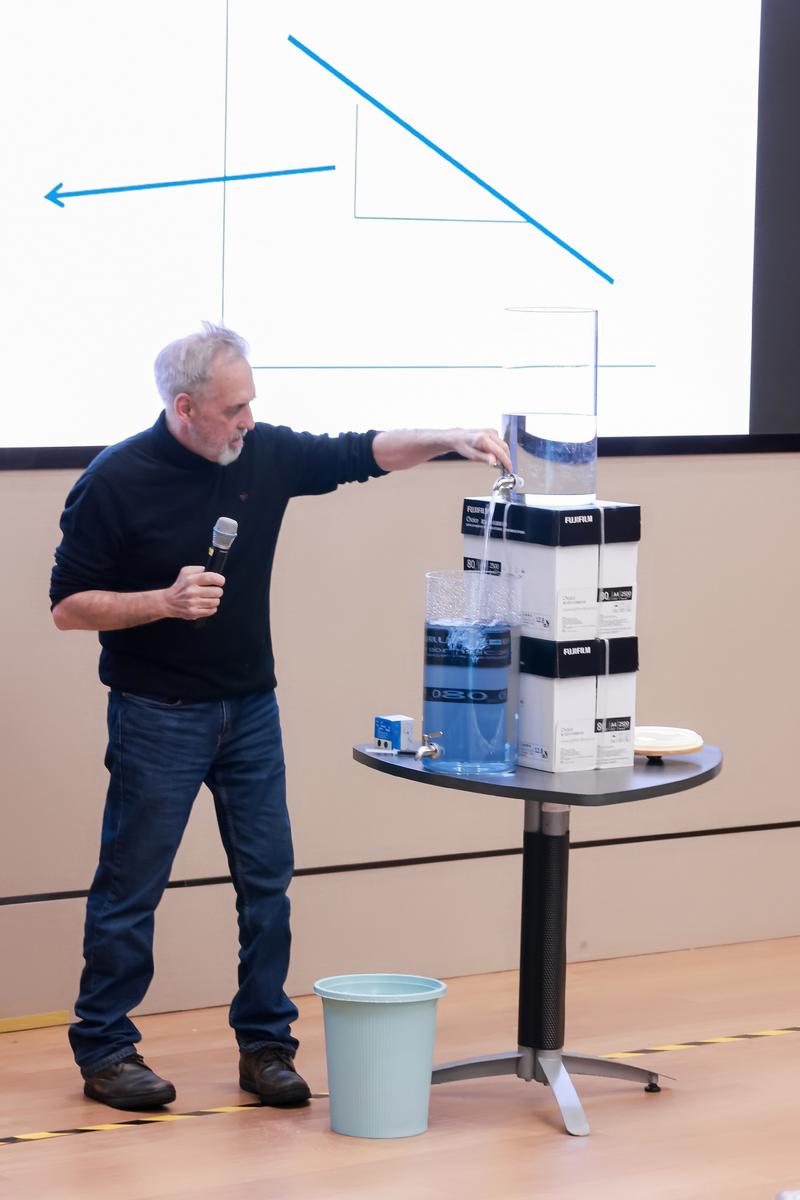Primary school science teachers attend a five-day course that offers new methods and access to resources to help them spark the imagination of their students, Xing Wen reports.
 A training course enables primary school teachers from Guangdong province's Shenzhen and Meizhou to experience advanced technologies in synthetic biology. (PHOTO PROVIDED TO CHINA DAILY)
A training course enables primary school teachers from Guangdong province's Shenzhen and Meizhou to experience advanced technologies in synthetic biology. (PHOTO PROVIDED TO CHINA DAILY)
Demonstrating magnetic fields using iron filings is a simple and classic method to learn about magnets.
Basically, it requires sprinkling the iron filings on a piece of light-colored paper on a flat surface and the using the magnet to manipulate them. Like a murmuration of starlings, the filings follow the magnet around the paper, providing an effective visual demonstration.
Unfortunately, the aforementioned method is not ideal, nor portable enough, for a teacher to show the whole class at the same time.
That might have once been an annoying problem for Guo Haifen, 23, a primary school science teacher in Meizhou, Guangdong province.
However, after she attended a recent five-day training course for primary school science teachers, it's no longer a problem.
There, the novice educator was impressed by an experienced science teacher's visual exploration of magnetic fields.
"The teacher took a glass bottle which contains a mix of paraffin oil and iron filings. A long test tube was then positioned in the middle of the container. After he put a bar magnet into the tube, the iron filings started to move and form directional lines of the magnetic field, three-dimensionally," she recalls.
"It was such a clever solution. I've been inspired to use simple tools to make practical teaching aids on my own."
The training course, which ran between Feb 6 and 10, gathered 50 primary school science teachers from Guangdong province's Shenzhen and Meizhou to share their respective experiences in delivering science class, visit labs with the latest equipment, follow established scientists in conducting experiments and listen to their lectures on such cutting-edge topics as neurology, robotics, synthetic biology and the metaverse.
 Attendees of the course study soft-bodied robots closely. (PHOTO PROVIDED TO CHINA DAILY)
Attendees of the course study soft-bodied robots closely. (PHOTO PROVIDED TO CHINA DAILY)
Those scientists include Erwin Neher, winner of the Nobel Prize in physiology or medicine, John Roger Speakman, a biologist and a foreign academician with the Chinese Academy of Sciences, and Pan Yi, director of the school of computer science with CAS Shenzhen Institute of Advanced Technology.
Guo, the course attendee, once studied bioscience at Guangzhou University.
"It's a horizon-widening and inspiring experience for me to get to know the latest advances in scientific research in the fields that I once studied as a university student," she says.
The course also took her to visit schools that have incorporated science education into the curricula and even their architectural designs. Sciensly Primary School in Shenzhen's Nanshan district is among them.
"The school is just like an amusement park, where huge containers have been set up as a space to grow different species of plants, which is full of fun," she says.
The course was co-initiated by the department of teacher education with the Ministry of Education, as well as the academic divisions and the bureau of science communication at CAS, to continuously improve teachers' scientific literacy and further cultivate young scientists.
"Through long-term research and practice, we've found that effective elementary education capitalizes on children's intrinsic interest in science, and these science teachers in elementary schools play a key role in cultivating youngsters with proper science education," says Zhou Dejin, director of the Bureau of Science Communication at CAS.
Zhou notes that he hopes the science teachers who attended the training course will, in the future, also get easy access to the scientific research and specialist facilities, including labs, astronomical observatories, field stations and arboretums owned by CAS, and make use of these resources in designing or delivering science classes.
"We welcome them to organize educational activities and return with their students," Zhou adds.
 British biologist John Roger Speakman conducts an experiment during a presentation to the attendees. (PHOTO PROVIDED TO CHINA DAILY)
British biologist John Roger Speakman conducts an experiment during a presentation to the attendees. (PHOTO PROVIDED TO CHINA DAILY)
Tu Yujuan, a science teacher with the Experimental School of Shenzhen Institute of Advanced Technology, says that if these scientific facilities and equipment can be made available for science teachers, it will be more convenient for them to explain certain subjects to young students.
"For instance, normally we use animated videos or posters to visualize how the human blood circulatory system works," she says.
"An immersive and interactive virtual reality application can be more effective in helping students understand the system."
Tu, on one hand, attaches importance to incorporating advanced scientific resources in elementary education, and on the other, highlights the importance of being an acute observer of details in everyday life, which might spark young students' interest in science.
She says that her students once felt confused when they were required to wash their hands frequently.
The teacher took them to investigate the impact of washing hands in a lab.
"I encouraged them to observe, through the microscope, the bacteria, fungi and other microorganisms on an unwashed hand and a washed hand. By applying scientific methods, they now understand why hand hygiene is important," she says.
A graduate of the College of Chemistry and Environmental Engineering in Shenzhen University, Tu enjoys being a primary school science teacher, as she has found the curiosity of her students is both infectious and inspiring.
"I hope I can help turn their curiosity into lasting motivation for their exploration of science," she says.
As the training course concluded, a survey was conducted to collect the thoughts of the attendees.
"A keyword in their feedback is 'enthusiasm'," recalls Ding Ningning, one of the developers of the training course and a publicist at CAS Shenzhen Institute of Advanced Technology.
"Many of them used to be disheartened, as science is a course traditionally overlooked in elementary education. However, feeling that they are supported by such abundant educational resources, their enthusiasm has been ignited," says Ding.
Contact the writer at xingwen@chinadaily.com.cn


